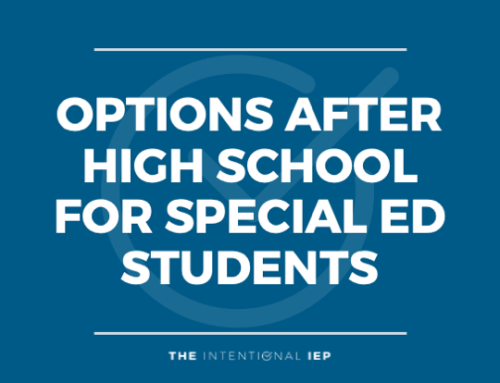Inclusive education is crucial for students with disabilities to thrive academically and socially. Individualized Education Programs (IEPs) ensure students receive the necessary accommodations and support to succeed in their educational journey. However, it is equally important for students to understand their IEPs and actively participate in discussions surrounding their accommodations. This post will delve into the significance of self-advocacy and how educators can foster it in students. Additionally, we will explore why students need to comprehend their disabilities, enabling them to grasp the purpose behind their accommodations.
The Importance of Self-Advocacy
Self-advocacy empowers students with disabilities to take control of their education. It helps them develop crucial skills that extend far beyond the classroom, such as problem-solving, decision-making, and communication. By advocating for themselves, students become active participants in their educational journey. Here are several reasons why self-advocacy is essential:
Enhances Confidence and Independence
When students understand their rights and are equipped with self-advocacy skills, they gain confidence in navigating academic and social situations. This confidence fosters independence, allowing them to take ownership of their learning experiences.
Promotes Self-Determination
Self-determination is the ability to set goals, make choices, and take responsibility for one’s actions. By encouraging self-advocacy, educators foster self-determination skills in students, enabling them to make informed decisions about their education.
Develops Effective Communication Skills
Advocating for oneself requires effective communication skills. Students must learn how to express their needs, concerns, and preferences clearly and assertively. By nurturing these skills, educators equip students with tools they can carry throughout their lives.
Understanding Accommodations and IEPs
Before students can effectively advocate for themselves, they must understand what accommodations and IEPs are. Educators play a vital role in ensuring that students are aware of their disabilities and how these impact their learning experiences. The Self-Advocacy books and activities in this set can help make explaining the intricacies of special education to students easier.
Explaining Disabilities to Students
It is essential for educators to have open and honest conversations with students regarding their disabilities. These discussions should be age-appropriate, respectful, and tailored to each student’s specific needs. By explaining disabilities in a sensitive manner, students can better comprehend the challenges they face and the accommodations required to overcome them.
Introducing the Concept of Accommodations
Once students have an understanding of their disabilities, educators should introduce the concept of accommodations. Accommodations are adjustments made to the learning environment or instructional strategies to meet the unique needs of students with disabilities. In other words, the how of learning. Teachers should explain to students that accommodations are not a sign of weakness but rather tools that level the playing field and provide equal access to education.
The Intentional IEP has all of the resources you need to help you guide your students through understanding the accommodations & modifications that can help them be successful. Join here or click the image above.
Reviewing Individualized Education Programs (IEPs)
IEPs provide a framework for delivering appropriate accommodations and support to students with disabilities. Educators should review IEPs with students, explaining each section in clear and simple language. This ensures that students actively participate in their IEPs.
Strategies to Foster Self-Advocacy
To nurture self-advocacy skills in students, educators can implement various strategies within the classroom setting. These strategies encourage students to take an active role in their education and advocate for their needs.
Teach Self-Awareness
Self-awareness is foundational for self-advocacy. Educators can facilitate self-awareness by helping students recognize their strengths, weaknesses, learning styles, and areas where they may require additional support. By understanding themselves better, students can effectively communicate their needs.
Foster Open Communication
Create an environment where students feel comfortable expressing their concerns or asking questions about accommodations. Encourage open dialogue during one-on-one meetings or through anonymous suggestion boxes, providing multiple avenues for student input.
Encourage Goal Setting
Goal setting empowers students to take ownership of their education. Encourage students to set short-term and long-term goals related to their academic performance and personal growth. Help them develop action plans on how to achieve these goals and regularly review progress together.
Practice Decision-Making Skills
Provide opportunities for students to make decisions related to their accommodations. For example, allow them to choose between different assistive technologies or suggest alternative methods for completing assignments. This practice encourages critical thinking and decision-making skills.
Role-Play Scenarios
Engage students in role-playing activities that simulate real-life situations where they may need to advocate for themselves. This could involve scenarios where they need to discuss accommodations with teachers or classmates, helping them develop assertiveness and effective communication skills.
Collaboration Between Educators and Students
Collaboration between educators and students is pivotal for fostering self-advocacy skills. When both parties work together as partners, it creates an environment where students feel supported and empowered.
Regular Check-Ins
Schedule regular check-ins with students to discuss their accommodations, progress, and any concerns they may have. These individual meetings provide an opportunity for open communication and allow educators to offer guidance while encouraging student input.
Involve Students in IEP Meetings
Invite students to participate in their IEP meetings whenever appropriate. This inclusion allows them to actively contribute to developing their academic plan, ensuring it accurately reflects their needs and goals.
Provide Resources and Support
Equip students with resources such as self-advocacy guides, assistive technology information, or peer mentorship programs to further support their self-advocacy journey.
By nurturing self-advocacy skills in students and ensuring they understand their disabilities and accommodations, educators empower them to take an active role in their educational journey. Fostering self-advocacy not only enhances academic success but also equips students with lifelong skills that promote independence, confidence, and effective communication. Through collaboration between educators and students, we can create inclusive learning environments where every student has the tools necessary to thrive.
Read Previous Post | Back to the Blog | Read Next Post





